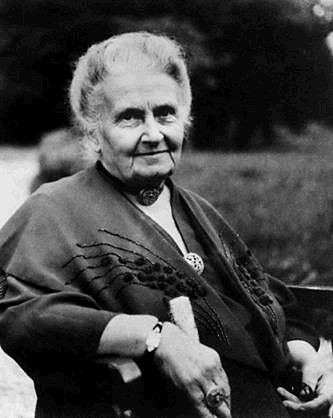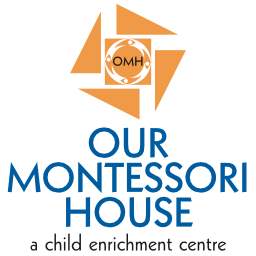
Dr. Maria Montessori
An Italian educator and reformer, Dr Maria Montessori was one of the most influential pioneers in early childhood education. She devised a method of education which combines a philosophy with a practical approach based on the central idea of freedom for the child within a carefully planned and structured environment.
The Montessori Method
PRACTICAL LIFE EXERCISES
The daily life tasks are performed by the children which develop basic personal and social skills. These exercises help develop a sense of responsibility and aid in motor skills, physical coordination, cognitive development, self-confidence and independence.
SENSORIAL EDUCATION
Montessori Sensorial activities help develop a child’s senses, and hone and fine-tune the awareness of their sensorial faculties. These activities help the child to sort out varied impressions gathered by the senses. They are designed to develop, order, broaden and refine sense perception.
LANGUAGE
The aspect of speech develops naturally in children. But writing and reading need to be cultivated. Therefore, Montessori Language Activities nurture the skills of writing and reading in children based on the sounds of speech.
MATHEMATICS
We all want complexities of things into simpler phenomena. This inclination to idealise the world, awakens our mathematical mind. Montessori Math activities provide hands-on experiences related to numbers and quantity. These experiences further help in understanding the fundamentals of simple addition, subtraction, multiplication & division to ensure a solid foundation before the child moves to formal learning.
CULTURAL SUBJECTS
Humans ‘learn’ to adapt through their culture and they transform the world, with their hands, according to their understanding. The Montessori Cultural area includes activities related to Geography, Science and History. Children learn by simple experiments, charts, stories and educational excursions.
EXPRESSION ACTIVITIES
Nature Walks, Field trips, Picnics, Festivals, Celebrations, Creative Art & Craft, Music & Movement, Sports and Physical activities, Outdoor Plays – are also an important part of our Montessori curriculum.
Creative and exploratory activities in these areas provide the child with the self-worth and confidence to last a lifetime. An all rounded exposure to all facets of learning, bringing forth the creativity of a child is what we aim for.
- ‘Children teach themselves’. This simple and profound truth inspired Maria Montessori’s lifelong pursuit of research in educational reform, methodology, psychology and teaching – all based on her dedication to furthering the self-creating process of the child.
- The Montessori classroom is structured to enhance social and learning skills. By experiencing the class as a functioning social community, the child is trained in the fundamental social qualities that form the basis of responsible individuals.
- Children attain confidence through achievement.
- Children learn to work co-operatively within a group and the contagious enthusiasm encourages the development of individual talents and interests.
- The Montessori method aims to develop a child’s concentration, co-ordination, independence, self-discipline, initiative, and persistence in completing tasks, creative self-expression, orderliness, and desire to learn.
- Children are encouraged to reach full potential through teaching methods that develop the whole personality of the child – not merely intellectual faculties, but also powers of deliberation, independent choice and associated emotional development.

